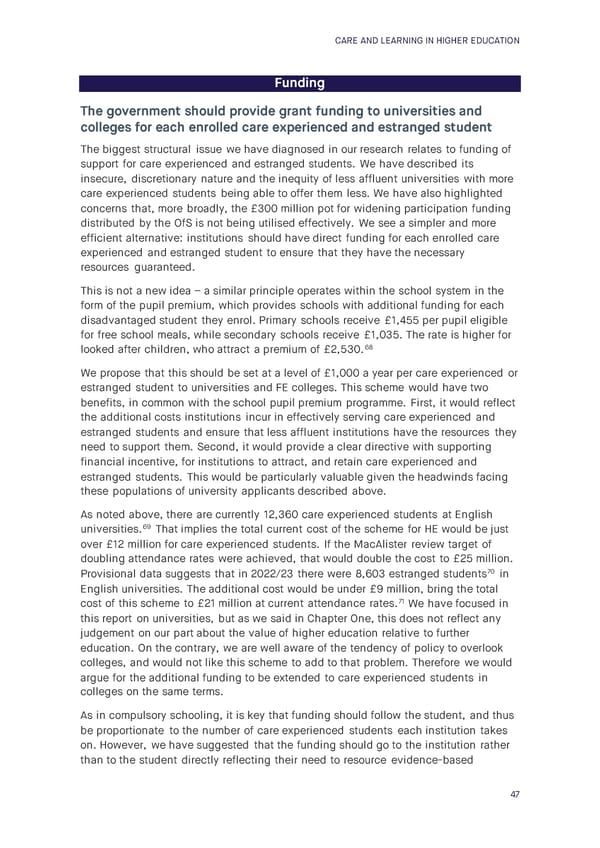CARE AND LEARNING IN HIGHER EDUCATION Funding The government should provide grant funding to universities and colleges for each enrolled care experienced and estranged student The biggest structural issue we have diagnosed in our research relates to funding of support for care experienced and estranged students. We have described its insecure, discretionary nature and the inequity of less affluent universities with more care experienced students being able to offer them less. We have also highlighted concerns that, more broadly, the £300 million pot for widening participation funding distributed by the OfS is not being utilised effectively. We see a simpler and more efficient alternative: institutions should have direct funding for each enrolled care experienced and estranged student to ensure that they have the necessary resources guaranteed. This is not a new idea – a similar principle operates within the school system in the form of the pupil premium, which provides schools with additional funding for each disadvantaged student they enrol. Primary schools receive £1,455 per pupil eligible for free school meals, while secondary schools receive £1,035. The rate is higher for looked after children, who attract a premium of £2,530.68 We propose that this should be set at a level of £1,000 a year per care experienced or estranged student to universities and FE colleges. This scheme would have two benefits, in common with the school pupil premium programme. First, it would reflect the additional costs institutions incur in effectively serving care experienced and estranged students and ensure that less affluent institutions have the resources they need to support them. Second, it would provide a clear directive with supporting financial incentive, for institutions to attract, and retain care experienced and estranged students. This would be particularly valuable given the headwinds facing these populations of university applicants described above. As noted above, there are currently 12,360 care experienced students at English universities.69 That implies the total current cost of the scheme for HE would be just over £12 million for care experienced students. If the MacAlister review target of doubling attendance rates were achieved, that would double the cost to £25 million. Provisional data suggests that in 2022/23 there were 8,603 estranged students70 in English universities. The additional cost would be under £9 million, bring the total cost of this scheme to £21 million at current attendance rates.71 We have focused in this report on universities, but as we said in Chapter One, this does not reflect any judgement on our part about the value of higher education relative to further education. On the contrary, we are well aware of the tendency of policy to overlook colleges, and would not like this scheme to add to that problem. Therefore we would argue for the additional funding to be extended to care experienced students in colleges on the same terms. As in compulsory schooling, it is key that funding should follow the student, and thus be proportionate to the number of care experienced students each institution takes on. However, we have suggested that the funding should go to the institution rather than to the student directly reflecting their need to resource evidence-based 47
 Care and Learning in Higher Education Page 47 Page 49
Care and Learning in Higher Education Page 47 Page 49